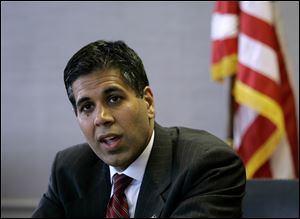
Ottawa Hills grad could be what President Trump wants in Supreme Court nominee
6/28/2018The country’s judicial future could end up in the hands of a man born and bred in Michigan and Ohio, an Ottawa Hills graduate who became the first South Asian-American named to a lifelong federal judgeship.
Experts say Amul Thapar, a federal appeals court judge, checks many boxes for President Trump, who has promised to appoint a conservative judge to replace retiring Supreme Court Justice Anthony Kennedy. Justice Kennedy, who announced his retirement Wednesday, was a critical swing vote during many of his 30 years on the court, and his departure has ignited political furor over the court’s constitutional direction in the coming decades.

Amul Thapar
Mr. Thapar, who sits on the 6th Circuit Court of Appeals in Cincinnati, was included on the list of Supreme Court nominees President Trump first released during his 2016 campaign. President Trump has said he will choose Justice Kennedy’s replacement from that pool, though he has not indicated publicly which candidates are among his top picks. Mr. Thapar has been considered a top nominee because of his ties to Senate Majority Leader Mitch McConnell (R., Ky.), who backed him for U.S. attorney in eastern Kentucky.
Mr. Thapar has many of the qualities President Trump is looking for in a nominee, said Lee Strang, a constitutional law scholar at the University of Toledo College of Law.
A member of the Federalist Society, Mr. Thapar believes in interpreting the Constitution as it was written by its creators, a tenet espoused by many conservatives.
At 49, Mr. Thapar not only has “tremendous experience” that spans private practice and serving as federal district judge for eastern Kentucky, he is also young enough to spend several decades on the court if he receives the nomination, Mr. Strang said.
“That means he would be there for 30, 35 years,” Mr. Strang said. “That’s somebody who’s going to be a long-standing legacy.”
Mr. Thapar, the son of Indian immigrants who settled outside Detroit and later in Ottawa Hills, where he graduated from high school in 1987, would be a diverse choice. He is one of three minorities on Mr. Trump’s list of 25 nominees
His background also differs from that of many past and sitting justices, who are Ivy League educated and East Coast bred, Mr. Strang said. Mr. Thapar attended Boston College and UC Berkeley School of Law, schools outside the elite circle that are nonetheless competitive.
Many of President Trump’s potential picks for Supreme Court have similar backgrounds and hail from Midwestern states. Two others on the list, Judges Raymond Kethledge and Joan Larsen, hail from Michigan.
“There are a lot of people [on that list] who didn’t go to Ivy League schools for law school and again that fits the electoral perspective,” Mr. Strang said.
After serving as U.S. attorney in eastern Kentucky for a decade, President Trump last year nominated Mr. Thapar to the 6th Circuit, which covers Ohio, Michigan, Kentucky, and Tennessee.
“Throughout his already impressive career of public service, Amul has shown an incredible intellect and an unshakable dedication to the law,” Senator McConnell said in a statement after Mr. Thapar became President Trump’s 6th Circuit nominee. Mr. Thapar was President Trump’s first judicial nomination after choosing Justice Neil Gorsuch to fill a year-long vacancy on the Supreme Court after Justice Antonin Scalia’s death.
Mr. Thapar recently faced criticism from Demand Justice, a nonprofit that has released ads criticizing candidates on President Trump’s Supreme Court list. In an ad posted on YouTube, the group called Mr. Thapar one of President Trump’s “far right” judges who would allow billionaires to pour unlimited dollars into elections, based on an interpretation of his decisions in prior cases.
Mr. Thapar did not return a call for comment for this story.
Lillian BeVier, who has taught alongside Mr. Thapar at the University of Virginia School of Law, said he is known for being fair and principled.
“His district and circuit court opinions have been thoughtful, carefully analyzed, well reasoned, and well written,” she said. “He believes it is a judge’s duty to apply the law as written and not be a legislator.”
Contact Liz Skalka at lskalka@theblade.com, 419-724-6199, or on Twitter @lizskalka.